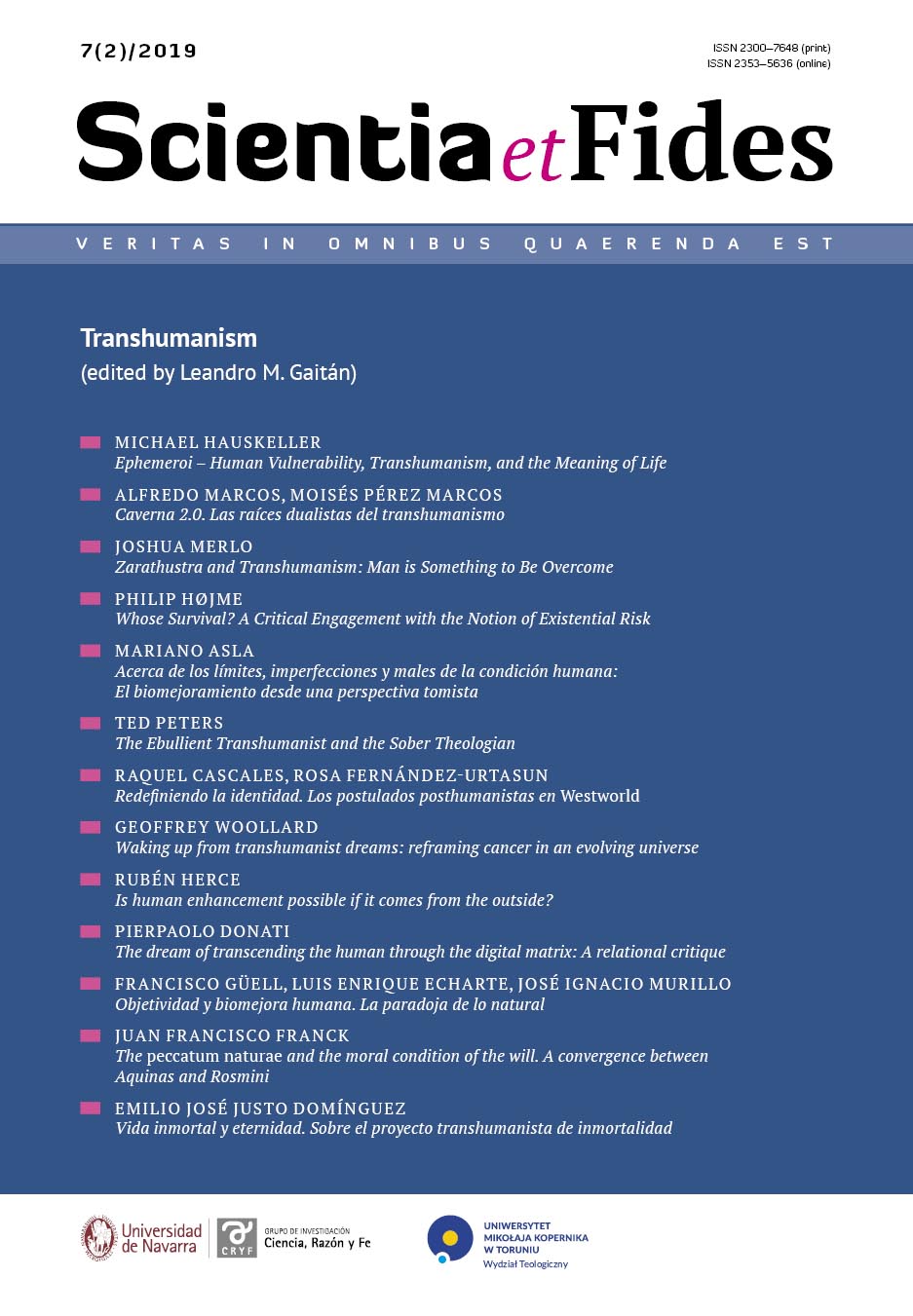Vida inmortal y eternidad. Sobre el proyecto transhumanista de inmortalidad
Słowa kluczowe
cuerpo, eternidad, felicidad, inmortalidad, resurrecciónAbstrakt
Algunos autores transhumanistas hacen la profecía de inmortalidad gracias a la transferencia de la mente humana a un ordenador superinteligente que garantizaría la pervivencia de la persona. Esa inmortalidad significaría una vida feliz. En este artículo se pretende mostrar que esa supuesta pervivencia indefinida no es exactamente lo que se ha entendido habitualmente por inmortalidad. Además, se intenta pensar lo que es la inmortalidad a partir de la comprensión teológica de la eternidad y de la comunión personal en la que consiste la vida de Dios. Cuestiones decisivas en este diálogo con las posturas del transhumanismo son la significación del cuerpo para la persona humana y lo que es la felicidad.Bibliografia
Alexandre, Laurent. 2011. La mort de la mort. Comment la technomédicine va bouleverser l’humanité. Paris: JCLattès.
Assmann, Jan et al. 2001. “Unsterblichkeit”. En Historisches Wörterbuch der Philosophie, ed. por Joachim Ritter, Karlfried Gründer, y Gottfried Gabriel, vol. 11, 275–294. Basel: Schwabe, 275–294.
Balthasar, Hans Urs von. 1997. Teodramática 5. El último acto. Madrid: Encuentro.
Blasco, María A. y Salomone, Mónica G. 2016. Morir joven, a los 140. Barcelona: Paidós.
Brook, Andrew y Stainton, Robert J. 2000. Knowledge and Mind. A Philosophical Introduction. Cambrige (CA): MIT.
Bostrom, Nick. 2005. “A History of Transhumanist Thought”. Journal of Evolution and Technology 14: 1–25.
Chillón, José-Manuel y Marcos, Alfredo. 2015. “Técnica y sentido”. SCIO. Revista de Filosofía 11: 77–99.
Conill, Jesús. 2019. Intimidad corporal y persona humana. De Nietzsche a Ortega y Zubiri. Madrid: Tecnos.
Cordeiro, José-Luis y Wood, David. 2018. La muerte de la muerte. La posibilidad científica de la inmortalidad física y su defensa moral. Barcelona: Deusto.
Cortina, Albert y Serra, Miquel-Ángel. (coords.) 2015. ¿Humanos o posthumanos? Singularidad tecnológica y mejoramiento humano. Barcelona: Fragmenta.
De Grey, Aubrey. 2013. El fin del envejecimiento. Los avances que podrían revertir el envejecimiento humano durante nuestra vida. Berlín: Lola Books.
Diéguez, Antonio. 2017. Transhumanismo. La búsqueda tecnológica del mejoramiento humano. Barcelona: Herder.
Gesché, Adolph. 2001. El destino. Dios para pensar V. Salamanca: Sígueme.
Gesché, Adolph. 2002. El hombre. Dios para pensar II. Salamanca: Sígueme.
Harari, Yuval Noah. 2016. Homo Deus: Breve historia del mañana. Barcelona: Debate (3ª ed.).
Hauskeller, Michael. 2013. Better Humans? Understanding the Enhancement Project. Durham: Acumen.
Justo, Emilio J. 2017. La salvación. Esbozo de soteriología. Salamanca: Sígueme.
Kull, Anne. 2016. “Cyborg and Religious? Technonature and Technoculture”. Scientia et Fides 4: 295–311.
Kurzweil, Ray. 2005. The Singularity is Near. When Humans transcend Biology. New York: Viking.
Ladaria, Luis F. 2013. La Trinidad, misterio de comunión. Salamanca: Secretariado Trinitario (3ª ed.).
Magnin, Thierry. 2017. Penser l’humain au temps de l’homme augmenté. Face aux défis du transhumanisme. Paris: Albin Michel.
Marcos, Alfredo. 2018. “Bases filosóficas para una crítica al transhumanismo”. ArtefaCToS. Revista de estudios de la ciencia y la tecnología 7: 107–125.
Marías, Julián. 1995. La felicidad humana. Madrid: Alianza (5ª ed.).
Modis, Theodore. 2012. “Why the Singularity Cannot Happen”. En Singularity Hypotheses, ed. por Amnon H. Eden et al., 311–340. Berlin–Heidelberg: Springer.
Moravec, Hans. 1988. Mind Children. The Future of Robot and Human Intelligence. Cambridge (MA): Harvard University.
Noriega Fernández, Roberto. 2019. “El retorno de Lázaro. La resurrección transhumanista”. En El transhumanismo en la sociedad actual, ed. por Enrique Somavilla Rodríguez, 175–221. Madrid: Ed. Agustiniana.
Pröpper, Thomas. 2011. Theologische Anthropologie, vol. II. Freiburg–Basel–Wien: Herder.
Proudfoot, Diane. 2012. “Software Immortals: Science or Faiht?”, En Singularity Hypotheses, ed. por Amnon H. Eden et al., 367–389. Berlin–Heidelberg: Springer.
Ratzinger, Joseph. 2007. Escatología. La muerte y la vida. Barcelona: Herder (2ª ed.).
Sesboüé, Bernard. 2015. L’homme, merveille de Dieu. Essai d’anthropologie christologique. Paris: Salvator.
Tipler, Frank J. 1995. The Physics of Immortality. Modern Cosmology, God and the Resurrection of Dead. London: Macmillan.
Zubiri, Xavier. 1997. El concepto teologal del hombre: Cristianismo. Madrid: Alianza.
Pobrania
Opublikowane
Jak cytować
Numer
Dział
Licencja
CC BY ND 4.0. Posiadaczem prawa autorskiego (Licencjodawcą) jest Autor, który na mocy umowy licencyjnej udziela nieodpłatnie prawa do eksploatacji dzieła na polach wskazanych w umowie.
- Licencjodawca udziela Licencjobiorcy licencji niewyłącznej na korzystanie z Utworu/przedmiotu prawa pokrewnego w następujących polach eksploatacji: a) utrwalanie Utworu/przedmiotu prawa pokrewnego; b) reprodukowanie (zwielokrotnienie) Utworu/przedmiotu prawa pokrewnego drukiem i techniką cyfrową (e-book, audiobook); c) wprowadzania do obrotu egzemplarzy zwielokrotnionego Utworu/przedmiotu prawa pokrewnego; d) wprowadzenie Utworu/przedmiotu prawa pokrewnego do pamięci komputera; e) rozpowszechnianie utworu w wersji elektronicznej w formule open access na licencji Creative Commons (CC BY-ND 3.0) poprzez platformę cyfrową Wydawnictwa Naukowego UMK oraz repozytorium UMK.
- Korzystanie przez Licencjobiorcę z utrwalonego Utworu ww. polach nie jest ograniczone czasowo ilościowo i terytorialnie.
- Licencjodawca udziela Licencjobiorcy licencji do Utworu/przedmiotu prawa pokrewnego nieodpłatnie na czas nieokreślony
PEŁEN TEKST UMOWY LICENCYJNEJ >>
Statystyki
Liczba wyświetleń i pobrań: 1539
Liczba cytowań: 1



